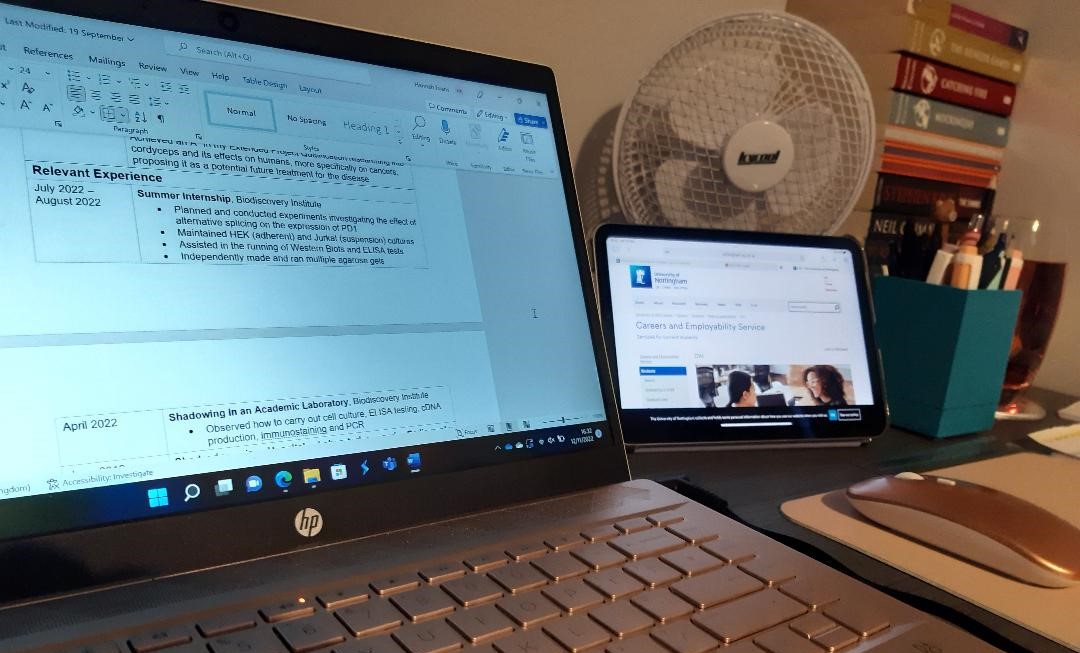
January 10, 2023, by mzyhe3
Acing Applications – My Top Tips For a Cancer Sciences Placement Year CV
By Hannah Evans, Cancer Sciences student blogger
So, you’ve found a company offering an amazing placement that you’d love for your fourth year. But now comes the hard part, getting accepted onto it. Different placements have different requirements for their applicants, but one thing they all have in common is needing a CV. After writing what feels like a billion of these this month, I’ve picked out some tips and tricks that might help yours stand out from the crowd.
Layout
One of the first things discussed in the CV review I had with the Careers Service was layout. You want your name centred at the top so it’s easy to spot. Then, give a short introduction to yourself and what you’re looking for. Here you want to be specific; don’t just say “I’m hard-working and looking for a job in STEM”. Instead, say something along the lines of “I’m a hard-working, determined and driven Cancer Sciences student, currently looking for a placement in the field of cancer cell biology”. Don’t say too much, but make a good first impression with this opening line.
Prioritise
You want your CV to be eye catching and easy to read, so that means you’re going to have to be picky about what you put on there. Don’t use the same CV for your placement as you used for your summer job; tailor it to your audience! For me, this meant talking less about my skills gained as a waitress and more about the practical skills I’ve learnt in labs at university. Of course, it’s still good to write about other work experience, but if you have to cut anything down then make sure it’s the least relevant stuff.
One thing I’ve realised biotech companies love to see is that you have previous lab experience, so definitely include this. If you haven’t had any relevant work experience, try your best to get some! Even if this is just talking about labs you’ve done for modules on your course, mention it on the first page. Remember, the Cancer Sciences course offers summer studentships after your second year. I did one of these and I cannot recommend it enough! Oh, and whilst you’re there, do cell culture and an ELISA test – that’s something everywhere wants you to know how to do.
Order
Now you’ve whittled down what you want to include, you now need to decide what order to say it all in. For most CVs its best to start in reverse chronological order, putting the most recent things first. Likelihood is that what you’ve done more recently will be the most relevant anyway. It’s also important to think about what the company will be most interested in. I found this was often mentioned in the job description. If the role requires a qualification, then best to mention your education before your hobbies.
Concise
Employers get hundreds of CVs, they don’t want to be reading mountains of text. So, bullet points are your friend! If you can cut out words, DO! I worried at first that doing this made me seem a bit robotic, as it doesn’t flow as nicely without all the waffle, but when you’re trying to get the information across it’s better to keep it short and sweet. Besides, you can display your great English ability later in the cover letter.
University
A lot of CVs I’ve seen list the university as another place of education and don’t go into much more than that. By doing this you could be leaving out key information that makes you stand out from others! Every university is slightly different; just because two do biochemistry doesn’t mean they’re identical. If you do Cancer Sciences then you already stand out when it comes to going for an oncology related placement. Cancer Sciences is a niche degree, and a lot of employers won’t know the details of what you actually study in it. So, mention specific modules and practicals you’ve done if they’re relevant. In my opinion this is one of the best pieces of advice I’ve been given. Being specific about how your education is tailored towards what the company is after means that even if every candidate has the same qualification, you will stick out as a better fit.
To find out more about writing CVs, I’d hugely recommend attending a CV workshop or booking a CV review with the Careers Service.
No comments yet, fill out a comment to be the first

Leave a Reply